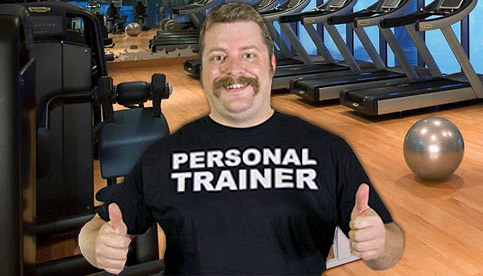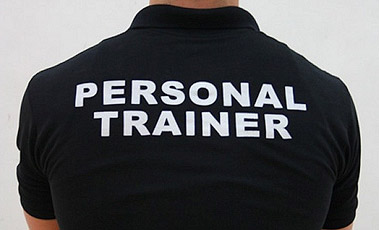ARE PERSONAL TRAINERS WORTH IT? (WHY 90% ARE A WASTE OF MONEY)

It’s one of my biggest pet peeves in the fitness industry:
The average, unqualified personal trainer at your typical big box gym charging huge hourly rates for mediocre-at-best services.
While there certainly are plenty of knowledgeable, physically fit trainers out there who do provide high quality, accurate guidance to their clients, the truth is that the “good ones” are very few and far between.
The plain fact is that far more personal trainers than not are quite simply a waste of money, time and effort for the average beginner trying to get into shape.
I know that might sound a bit harsh, but it’s the honest truth.
They probably have good intentions, but the majority of typical fitness trainers out there are just not very knowledgeable in the areas of training and nutrition and lack the experience needed to be truly effective at what they do.
Not only that, but most standard personal training services are far from cheap and can range anywhere from $50-$75 or more per hour, which is a significant cost that adds up quite a bit over the long term.
Why Most Personal Trainers Are Just Not Worth It

The average beginner out there probably doesn’t realize this, but the term “certified personal trainer” actually means very little on its own.
Although the uniform and name tag may look fancy and professional, in most cases getting a personal training license really doesn’t require much more than the memorization of some very basic (and likely outdated) information over a few weekend courses.
Anyone out there can fairly easily become a certified trainer regardless of their fitness level or previous experience, and in my view it should be far more difficult to obtain a PT license than it currently is in most places.
In fact, spend a week or two conducting some proper research online, and as long as you’re following credible sources, you can very easily learn everything the average trainer knows and more just from that alone.
I’ve spent endless hours in a ton of different gyms throughout my life, and I always see the same predictable things over and over again no matter where I go…
- Trainers staring at their phones while their clients perform squats, deadlifts or any number of other basic exercises using horrendous, flat-out dangerous form.
- A skinny guy trying to bulk up his frame and put on muscle being prescribed a light weight circuit training style workout.
- A woman who is 100 pounds overweight being taken through an arm isolation workout consisting of tricep kickbacks and concentration curls.
- The over-use of “advanced techniques” like drop sets and super sets, as well as a deviation from basic compound free weight movements in favor of “fancy” exercises using stability balls, rubber tubing and other unnecessary machines.
The list just goes on and on and consists of every possible workout, nutrition and supplementation strategy imaginable that would steer an unsuspecting beginner down a far less than ideal path.
Personally, I find this very frustrating to watch.
It pains me to see someone putting in the time and focused effort thinking they’re receiving expert guidance toward their goals, when in reality they could be getting far better results using a different, much less expensive plan.
This is exactly why you’ll notice that most of the people using these services always come back to the gym looking the same week after week, and it’s also why a very high percentage of personal trainers themselves aren’t even in good shape to begin with.
I mean really…
Take a good hard look around the gym next time you’re there and you’ll probably notice that it’s actually pretty rare to see a trainer who is in legitimately impressive shape.
I recognize that being physically fit doesn’t necessarily indicate that one is knowledgeable on the subject (and vice versa), but in my opinion, you should at least look the part if you’re being paid to teach people how to be fit.
I wouldn’t take financial advice from someone who was broke and living in their mom’s basement, and I wouldn’t take dating advice from someone who was incapable of getting a date. Health and fitness should be no different.
You certainly don’t need to be “shredded” any means, but being blatantly overweight or looking as if you’ve never touched a weight in your life is unacceptable for someone carrying a “fitness trainer” title.
At the very least, if you’re a personal trainer who isn’t currently in the best shape, you should still be someone who has made considerable progress from where they started.
Looking To Hire A Trainer? Do Your Research First!

Don’t get me wrong here…
I’m of course not saying that ALL personal trainers are a waste of money; all I’m saying is that you’ll have to do some extensive research first in order to find one that is truly worth investing in.
Otherwise, you’ll have no idea whether you’re truly in good hands or whether your consistent effort in the gym will simply be going to waste along with your hard-earned money.
These are a few key areas you’ll want to delve into with your potential personal trainer first in order to see if they truly know their stuff or if they’d be better off working behind the front desk as opposed to the gym floor…
Results

If you’re being promised any sort of crazy, over-the-top results in a short period of time, you’ll definitely want to steer clear and look elsewhere.
All it means is that this trainer either doesn’t know what they’re talking about or that they’re intentionally exaggerating just to get your business.
Building muscle and losing fat to a significant degree is a slow and gradual process involving a good amount of dedicated time and effort, and any good trainer worth their salt should be up front and honest about that.
If your primary goal is to bulk up, you shouldn’t be expecting to gain any more than about half a pound of muscle per week during your first year of training.
This might not sound like a lot, but it’s a standard rate of growth for a natural trainee with average genetics assuming everything is done properly and consistently.
If your primary goal is to lean down, an overall weight loss rate of about 1-2 pounds per week is standard for most people.
Those who are significantly over weight can usually burn fat a bit faster than this (perhaps 3 pounds per week or slightly higher), but the 1-2 pound range is where most people should expect to stabilize once the initial stages of their program are complete.
If the results your trainer is promising fall much outside of these ranges, that should raise an immediate red flag.
Training

Ask what type of workouts they’ll be putting you through to get a further idea of whether or not this trainer would be a worthwhile investment.
As a beginner, you’ll want to make sure that your routine meets the following criteria:
- It should be centered around basic, heavy compound exercises performed at a relatively high intensity around 1-2 reps short of muscular failure.
- The primary focus should be on achieving progressive overload by consistently adding more weight to the bar over time on all of your key lifts while using proper form at all times.
- Each individual muscle should be directly trained at least twice per week using full body workouts or an upper/lower split, as this will allow you to make the fastest muscle size and strength gains during the initial phases of lifting.
If your would-be trainer is planning to guide you through a 4-5 day per week “bro split” using a high number of isolation exercises, “advanced training techniques” or some crazy weight training/cardio hybrid, this is certainly not going to be the best use of your effort as a beginner.
You’ll also want to make sure that cardio isn’t being over-emphasized.
Weight training should always form the underlying basis of any effective workout routine, with only a moderate amount of extra cardio added in.
The typical 4 or 5 day per week marathon cardio sessions that many trainers will aimlessly recommend are not only a huge waste of time and effort, but are also potentially counterproductive by interfering with workout recovery and encouraging unwanted muscle loss.
Nutrition

If you’re being given re-hashed, outdated nutritional advice claiming that you must “eat clean” 24 hours a day, 7 days per week…
Avoid treat foods or alcohol in any and all amounts…
Follow some some sort of restrictive diet plan such as gluten-free, paleo, low carb or low fat…
Consume highly specific combinations of foods at different times of the day such as pre workout, post workout, in the morning or before bed…
Or that you must eat 6 small meals per day spaced out every 2-3 hours in order to get impressive results…
Then all this trainer is really going to do for you is unnecessarily over-complicate your eating plan, make your day to day life far less enjoyable, and minimize the chances that you’ll actually be able to maintain an effective nutritional approach long term.
Proper nutrition is actually fairly straightforward, and it most certainly does not require that you obsess over tiny, insignificant details like meal frequency or meal timing, or that you become a slave to a bland, boring diet.
You don’t need to restrict the consumption of any single macronutrient, nor do you need to completely eliminate certain foods either.
Eating for muscle growth and fat loss is all about what you do in the overall picture as a whole, and any in-the-know personal trainer should understand this.
Your trainer should have you on a practical, well balanced eating plan based around the consumption of nutrient dense whole foods the majority of the time (around 80-90%), but that also incorporates some reasonable flexibility into the remaining 10-20% so that you can consume your favorite foods in moderation without hurting your results.
Your trainer should also be able to explain the fundamentals of calorie and macronutrient intake in relation to your individual body type, activity level and goals, as well as how your intake should be adjusted over time as your fitness progresses.
If all they do is hand you some generic “one size fits all” meal plan consisting of boiled chicken breast, broccoli and cottage cheese, you’ll want to immediately make a bee-line for the exit.
Supplementation

If the trainer you’re dealing with starts recommending a laundry list of different pills and powders that you’ll need to take (especially if they’re being sold through the gym), keep your money and look elsewhere.
Supplements should only play a very minor role in any fitness program, and they aren’t even a strict necessity at all in order to build muscle and lose fat effectively.
A few basic supplements can be included to improve the convenience of your plan and give you a very modest extra boost, but there really are only a small handful of products out there that are worth investing in at all, especially if you’re a beginner.
(You can download my Free Fitness Supplementation Guide for a breakdown of which supplements I recommend)
If your trainer starts advising that you purchase over-priced, ineffective products like fat burners, testosterone boosters, glutamine, “advanced” forms of creatine or over-hyped pre-workouts, that alone is reason enough to find someone else.
Are Personal Trainers Worth it? The Bottom Line

So, is a personal trainer worth it?
While there are plenty of awesome trainers out there with a wealth of accurate knowledge who do provide high quality, reasonably priced services to their clients…
The simple truth is that 90% or more of the trainers out there do NOT fall into that category and are hugely over-charging for programs that are, at best, far less than ideal, and at worst, counter-productive or possibly even dangerous.
If you’re just starting out on your fitness journey and are searching for some initial guidance in the gym, don’t just assume that a “certified personal trainer” is all you need to look for.
There’s far more to it than that, and if you’re truly serious about your results then you’ll want to do some solid research first using the guidelines in this article before deciding to invest in any given trainer.
The right person can most definitely provide you with the knowledge and motivation needed to kick-start your progress and maximize your long term success, but the wrong person could easily sabotage your entire program right from the get go before you even get started.
If you found these tips helpful and want to skip the personal training step altogether, make sure to get your personalized training, nutrition and supplement plans using my free interactive video presentation below…
If you found this article helpful, make sure to sign up for your FREE custom fitness plan below...




